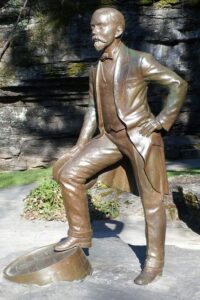In this month of love, I revisited John Coltrane’s A Love Supreme. The work of art is hard to resist. It is impossible to imagine how Coltrane heard this music. I envision the thousands of notes spinning around in the air above his head, and as inspiration possessed him, how he must have snatched each note, causing his saxophone to overflow as he created his masterpiece.
Nathaniel Mackey writes of Coltrane in his book of poems “Late Arcade,” that Coltrane seemed to “exhaust his horn as if there were infinite possibilities to it.” The infinite notes played in an infinite number of ways by a true genius is the proverbial strike of artistic lightening.
The story is told that Coltrane and his fellow musicians performed A Love Supreme only once in a live venue. When he finished and walked off stage Coltrane was heard saying “nunc dimittis servum tuum,” which translates “now dismiss your servant.”
This phrase was first spoken by Simeon from the gospel of Luke. It had been revealed to him that he would not die until he beheld the Messiah. When Simeon took the child into his arms, he knew he held the light of revelation, the glory of Israel, and the salvation of all people. For Simeon, this moment of perfection would never happen again.
How Simeon knew he held the Messiah could only be explained in mystical terms. How John Coltrane knew he had played a perfect piece of music is likewise a mystery. Both men knew the moment it happened that their quests in life were finished.
Coltrane and his fellow musicians had performed a perfect set of A Love Supreme. It could never be played like that ever again. To expect to repeat such an inspired level of excellence would be impossible. The performance was now a memory and such a memory can never be perfectly recreated.
Coltrane writes in the liner notes of the album that, “A Love Supreme is a ‘thank you’ to God.” He had come to a knowledge and understanding that he and his music were all about God and the gifts God had given him. Once Coltrane had that revelation, he was completely free to love the music and the great Giver of his gifts. Such is the beauty and mystery of all great art.





